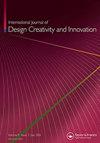Creativity and successful product concept selection for innovation
IF 2.5
Q4 ENGINEERING, MANUFACTURING
International Journal of Design Creativity and Innovation
Pub Date : 2021-01-02
DOI:10.1080/21650349.2020.1858970
引用次数: 7
Abstract
ABSTRACT Selecting novel product concepts for further development into successful innovations entails decision making under conditions of high uncertainty. The literature discusses several influencing factors for making accurate decisions in such situations, such as domain expertise to evaluate technical feasibility and market potential. Recent scholarship increasingly highlights the decision makers’ personal creative capabilities to have an important influence in dealing with uncertain options. This article examines an individual’s creativity and its relation to the individual’s propensity to select novel product concepts and to choose product concepts correctly for further development. We present an experimental study showing that an individual’s level of creativity increases the likelihood of accepting novel product concepts without negatively affecting decision accuracy. Domain expertise operationalized as familiarity with the intended, central use case or technology in the product concept neither influences the likelihood of accepting new product concepts nor decision accuracy. These findings have strong implications for companies in relation to managing individuals selecting product concepts for further development in early stages of the innovation process.创新的创造力和成功的产品理念选择
摘要选择新的产品概念以进一步发展为成功的创新需要在高度不确定性的条件下做出决策。文献讨论了在这种情况下做出准确决策的几个影响因素,例如评估技术可行性和市场潜力的领域专业知识。最近的学术研究越来越强调决策者的个人创造力,在处理不确定的选择时发挥重要影响。本文考察了个人的创造力及其与个人选择新颖产品概念和正确选择产品概念以进一步发展的倾向的关系。我们提出了一项实验研究,表明个人的创造力水平增加了接受新产品概念的可能性,而不会对决策准确性产生负面影响。领域专业知识被操作为熟悉产品概念中的预期、核心用例或技术,既不会影响接受新产品概念的可能性,也不会影响决策的准确性。这些发现对公司管理人员在创新过程的早期阶段选择产品概念以进行进一步开发具有重要意义。
本文章由计算机程序翻译,如有差异,请以英文原文为准。
求助全文
约1分钟内获得全文
求助全文
来源期刊

International Journal of Design Creativity and Innovation
ENGINEERING, MANUFACTURING-
CiteScore
3.80
自引率
27.80%
发文量
15
期刊介绍:
The International Journal of Design Creativity and Innovation is an international publication that provides a forum for discussing the nature and potential of creativity and innovation in design from both theoretical and practical perspectives. Design creativity and innovation is truly an interdisciplinary academic research field that will interest and stimulate researchers of engineering design, industrial design, architecture, art, and similar areas. The journal aims to not only promote existing research disciplines but also pioneer a new one that lies in the intermediate area between the domains of systems engineering, information technology, computer science, social science, artificial intelligence, cognitive science, psychology, philosophy, linguistics, and related fields. The journal covers, but is not restricted to, the following topics: ·Theories on Design Creativity and Innovation ·Cognition of Design Creativity ·Innovative Process ·Inventive Process ·Analogical Reasoning for Design Creativity and Innovation ·Design Synthesis ·Method and Tools for Design Creativity and Innovation ·Representation of Design Creativity and Innovation ·Education for Design Creativity and Innovation ·Concept Generation and Inspiration.
 求助内容:
求助内容: 应助结果提醒方式:
应助结果提醒方式:


